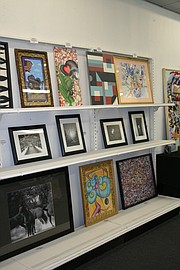CAIRO (AP) - A defiant Moammar Gadhafi vowed to fight to his "last drop of blood" and roared at supporters to strike back against Libyan protesters to defend his embattled regime Tuesday, signaling an escalation of the crackdown that has thrown the capital into scenes of mayhem, wild shooting and bodies in the streets.
The speech by the Libyan leader - who shouted and pounded his fists on the podium - was an all-out call for his backers to impose control over the capital and take back other cities. After a week of upheaval, protesters backed by defecting army units have claimed control over almost the entire eastern half of Libya's 1,000-mile Mediterranean coast, including several oil-producing areas.
"You men and women who love Gadhafi ... get out of your homes and fill the streets," he said. "Leave your homes and attack them in their lairs."
Celebratory gunfire by Gadhafi supporters rang out in the capital of Tripoli after the leader's speech, while in protester-held Benghazi, Libya's second-largest city, people threw shoes in contempt at a screen showing his address.
Gadhafi's retaliation has already been the harshest in the Arab world to the wave of anti-government protests sweeping the Middle East. Nearly 300 people have been killed, according to a partial count by the New York-based Human Rights Watch.
In two nights of bloodshed, Tripoli residents described a rampage by pro-Gadhafi militiamen - a mix of Libyans and foreign mercenaries - who shot on sight anyone found in the streets and opened fire from speeding vehicles at people watching from windows of their homes.
In a sign of the extent of the breakdown in Gadhafi's regime, one of his closest associates, Abdel Fattah Younis, his interior minister and commander of the powerful Thunderbolt commando brigade, announced in Benghazi that he was defecting and other armed forces should join the revolt.
"I gave up all my posts in response to the February 17 Revolution and my conviction that it has just demands," Younis, who was among the army officers who joined Gadhafi in his 1969 coup, told Al-Jazeera, referring to the date of the start of the protests.
The performance by Gadhafi on state TV Tuesday night went far beyond even the bizarre, volatile style he has been notorious for during nearly 42 years in power. Swathed in brown robes and a turban, wearing reflective sunglasses, he at times screamed, his voice breaking, and shook his fists - then switched to reading glasses to read from a green-covered law book, losing his train of thought before launching into a new round of shouting.
He spoke from behind a podium in the entrance of his bombed-out Tripoli residence hit by U.S. airstrikes in the 1980s and left unrepaired as a symbol of defiance.
At times the camera panned back to show the outside of the building and its towering monument of a gold-colored fist crushing an American fighter jet. But the view also gave a surreal image of Gadhafi, waving his arms wildly alone in a broken-down lobby with no audience, surrounded by torn tiles dangling from the ceiling, shattered concrete pillars and bare plumbing pipes.
He urged supporters to take to the streets to attack demonstrators, saying police would not interfere.
Gadhafi's call for a popular attack on protesters reflected the deeply unstable nature of the system he has created over his rule - the longest of any current Arab leader. He has long kept his military and other security forces relatively weak, fearing a challenge to his rule and uncertain of loyalties in a population of multiple tribal allegiances.
So far, the crackdown has been waged chiefly by militias and so-called "revolutionary committees," made up of Libyans and foreign fighters, many hired from other African nations.
Many army units in the east appear to have sided with protesters, and other more institutional parts of his regime have weakened. A string of ambassadors abroad have defected, as has the justice minister.
Protesters claim to control a string of cities, from the Egyptian border in the east - where guards at the crossing fled - to the city of Ajdabiya, about 450 miles farther west along the Mediterranean coast, said Tawfiq al-Shahbi, a protest organizer in the eastern city of Tobruk.
Ajdabiya is a key city near the oil fields of central and eastern Libya. Protesters and local tribesmen were protecting several of the fields and facilities around the city, said one resident, Ahmed al-Zawi.
Residents are also guarding one of Libya's main oil export ports, Zuweita, and the pipelines feeding into it, he said. The pipelines are off and several tankers that had been waiting in the port to load left empty, said al-Zawi, who said he visited Zuweita on Tuesday morning.
In the eastern cities of Tobruk and Benghazi, protesters raised the pre-Gadhafi flag of Libya's monarchy on public buildings. Protesters over the weekend overran police stations and security headquarters in Benghazi, taking control of the streets.
In Benghazi, celebratory residents organized themselves into units to protect property and manage traffic after pro-Gadhafi forces fled, said Farag al-Warfali, a banker. A committee was set up to organize and distribute the use of weapons confiscated from government warehouses, recruiting policemen and officers to carry the weapons for city protection, fearing a new attack.
"These are his dying words. He is a criminal and is ready to do anything. But we are ready for him," al-Warfali said of Gadhafi's speech. "Besides, most of his officers have deserted him anyway. He only has the mercenaries left."

